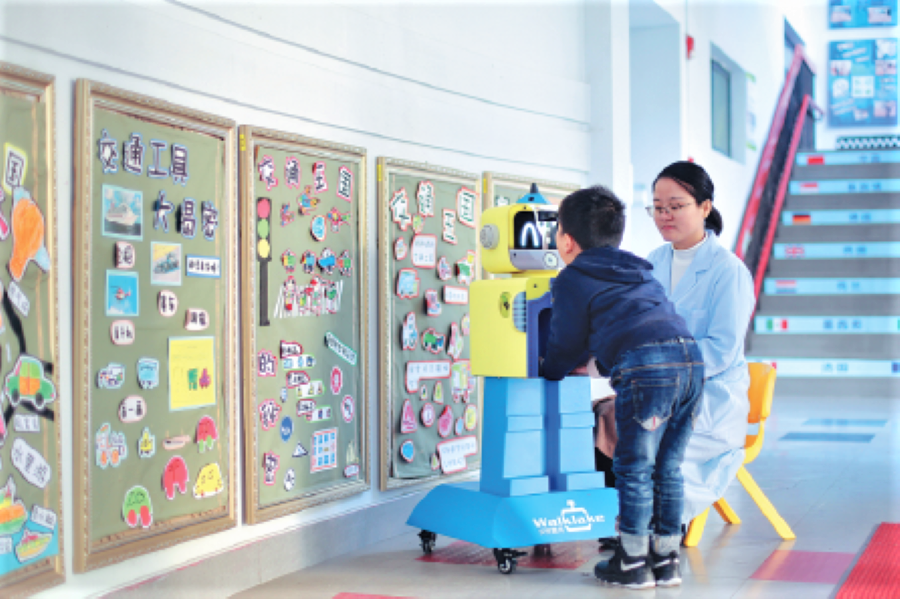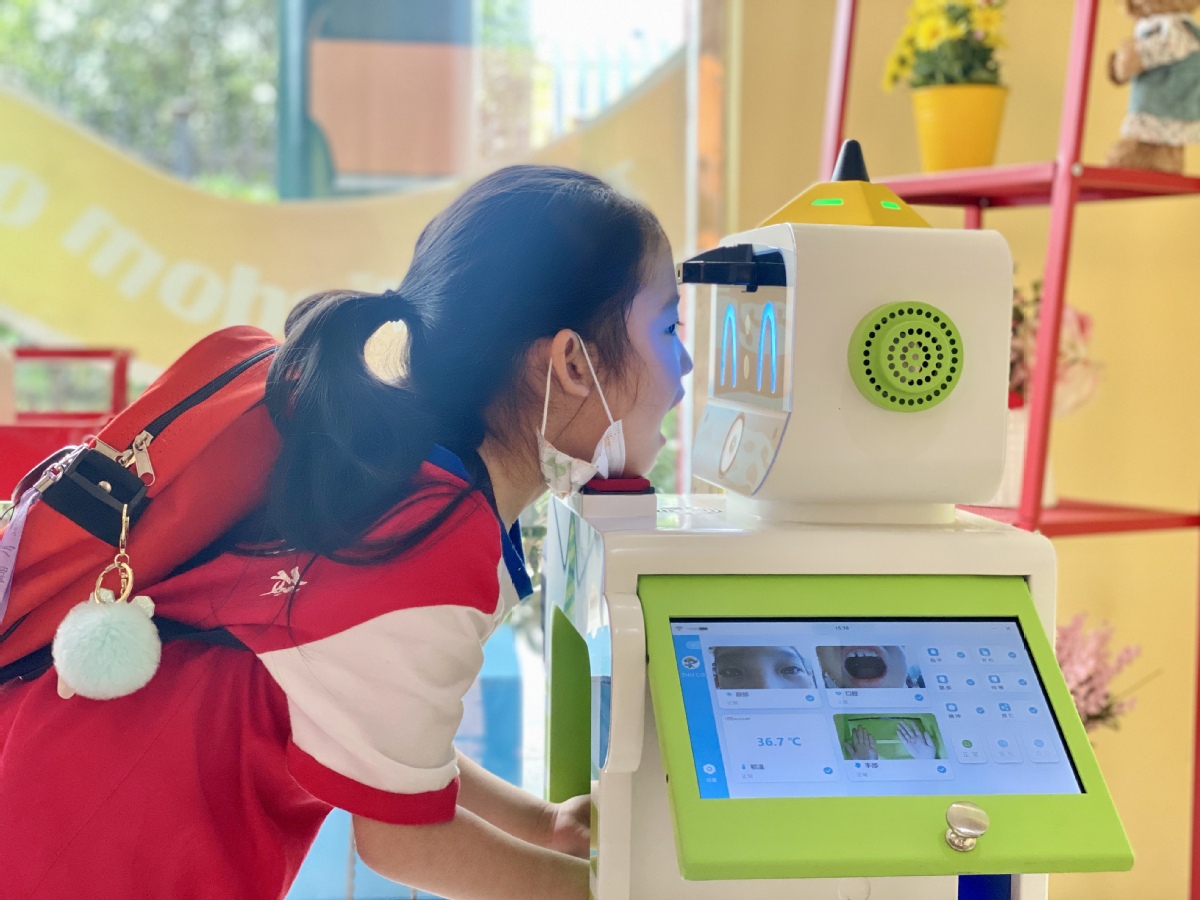
COVID-19 pandemic sparks demand for Walklake's products across world's schools
COVID-19 may have pushed many of China's troubled export-oriented firms to sell their products in the domestic market for sheer survival, but Suzhou Walklake Smart System Co Ltd, a Jiangsu province-based robot manufacturer, is a glorious exception, its top executive said.
The company has made notable inroads into overseas markets by exporting its health-screening robots used in schools.
With precise and medical-grade sensors, the robot can check students' body temperature, and examine their eyes, hands and mouth in seconds.
The novel coronavirus outbreak has brought new growth points for the sales of this product. But it has also created several challenges for the company.
Suzhou Walklake has received a large number of buy orders from overseas markets such as Russia, Spain, Turkey, India, Nigeria and the United Arab Emirates over the past four months.
Consequently, shipments have surged as many countries stepped up efforts to buy more epidemic prevention and control supplies, including face masks, ventilators, pharmaceutical products and service robots, said Zhang Ziyang, chairman of Walklake.
"We didn't expect to enter the international markets at such short notice because the commercial potential in the home market itself is big and attractive. So, we were trying to go global step by step," he said, adding the unexpected pandemic has forced educational institutions in both China and other parts of the world to raise their budgets for anti-epidemic materials and buy more intelligent products, in order to safeguard students' health.
Established in 2015, Walklake originally conducted research and development, and manufacturing activities for children-related healthcare service robots and solutions. Its customers were kindergartens and primary schools in provinces and municipalities in China, including Hubei, Henan, Beijing, Shanghai, Zhejiang and Fujian.
Strong domestic demand has led to the use of the company's robots in over 30,000 kindergartens across China.
Before the outbreak, morning inspections using its robots were a routine at many Chinese kindergartens. Now, that routine is a global practice, said Zhang.
"China's measures to adopt AI-enabled robots to detect abnormal health parameters in staff and students have helped them to either resume work or return to school. Such measures have drawn the attention of many foreign clients over the past four months," he said.
Overseas institutions remain interested in emulating China's methods of epidemic prevention and control and want to keep up with the country to prepare for re-opening of schools.
After some re-opened, a video of Walklake's robots assisting school nurses in morning routines emerged and went viral overseas. It has been viewed over 20 million times on global social media platforms such as Twitter and Facebook, the company executive said.
The robot boasts many new technological breakthroughs, and can be customized. For instance, Zhuyuan Kindergarten of Suzhou Foreign Language School has configured Walklake health-screening robots to help test abnormalities in children and prevent the spread of various infectious diseases, not just COVID-19.

Adoption of smart robots in school routines can safeguard students' health. It will facilitate better understanding of pupils' health information among parents, teaching and administrative staff, and be able to both monitor and track potential uncertainties well in time, said Dong Bin, general principal of Suzhou Foreign Language School, which runs 12 schools and kindergartens throughout East China's Jiangsu province.
The department of education and knowledge of the local government of Abu Dhabi, an emirate of the United Arab Emirates, has also contacted Walklake to explore the possibility of introducing the health-screening robot in its school management system.
Walklake head Zhang said the robots will not only play a big role this year but become many educational institutions' preferred long-term option to better monitor students' health in the post-pandemic era. The company will continue to rely on various online social networks and e-commerce platforms to expand its brand influence globally, especially in markets related to the Belt and Road Initiative.
Like Walklake, other domestic manufacturers have been gearing up to fulfill their overseas orders via the internet. Many of them have already designed new web pages with 3D features to display their latest products and services to overseas buyers and to minimize the adverse impact of international air travel restrictions.
Zhang noted demand for robots has exploded amid the coronavirus outbreak as potential new clients emerged beyond the educational sector. Apart from deploying disinfection robots and automated goods distributors, many businesses have adopted smart screening robots in their plants or offices to assist in their work operations and production resumption.
"Automatic data retention, statistics and analyses generated by our robots can provide support to the government's management of disease control," he said.
"The service robots are designed to help people improve their daily lives with a new lifestyle. During the prevention and control of the epidemic, many consumers have raised their health consciousness. This will boost demand for smart household appliances," said Li Qun, a researcher at the Chinese Academy of Science and Technology for Development in Beijing.
He said a large number of manufacturers are outgrowing the phase of being mere OEMs or original equipment manufacturers, or contract suppliers, for foreign companies. Many of them are trying to evolve into global-scale manufacturers in their own right by investing more in innovation, cross-brand collaboration, mergers and acquisitions.
Thanks to their technology accumulation and the country's well-developed 5G and 4G service networks, many Chinese companies have launched multiple products and technology solutions to help prevent and control the epidemic since February, said Zhang Yongjun, a researcher at the Beijing-based China Center for International Economic Exchanges.
Zhang predicted that more AI-enabled temperature testing systems, smart robots, warning platforms designed to limit human movement, voice-controlled elevators, and intelligent voice electronic medical record systems will be widely used in the domestic market soon.
"China's 'new infrastructure' development, with digitalization and innovation at its core, represents this promising future," he said. "For the short term, investments in this area will provide fresh impetus to post-epidemic economic growth, and a new round of market opportunities will therefore emerge for related businesses."





